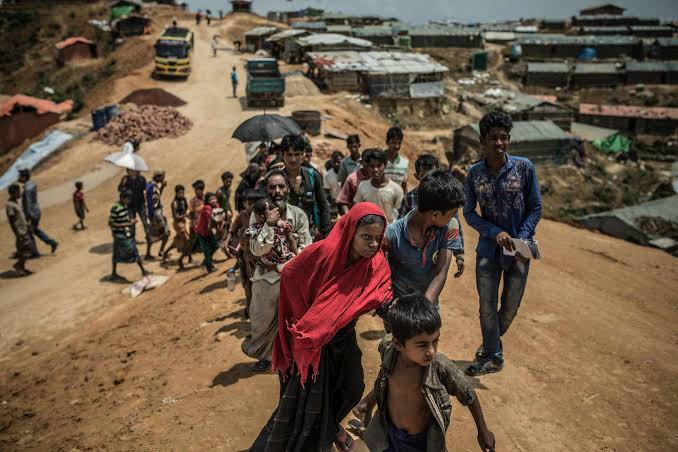01/10/2026

8 years of Rohingya influx: Crisis worsens, aid declines
Diplomatic Correspondent | Published: 2025-08-25 17:51:38

The Rohingya crisis is intensifying day by day. Eight years ago, nearly 750,000 Rohingya fled Myanmar’s Rakhine State to seek refuge in Bangladesh. Due to the pre-existing population and high birth rates, the number of Rohingya now sheltered in Bangladesh has risen to around 1.1 million.
Although a repatriation agreement was signed in 2017, not a single Rohingya has returned under its provisions.
Given the ongoing situation in Rakhine, there is still little chance of safe return. The international community also objects to any forced repatriation. As the crisis deepens, international aid for the Rohingya is declining.
According to the Inter-Sector Coordination Group, in 2025, $934.5 million was requested from the international community to address the Rohingya crisis. However, as of 11 August, only $332 million has been received, representing just 35% of the expected funds. In comparison, international aid met 72% of requested funds in 2018, 75% in 2019, 60% in 2020, 73% in 2021, 70% in 2022, 71% in 2023, and 68% in 2024.
Officials said that the declining support is influenced by rising global crises, including the war in Ukraine, the Gaza-Israel conflict, and political instability in Africa.
Being a long-standing issue, the Rohingya crisis is losing attention among donor countries. Moreover, many Western nations are cutting their global aid budgets. Analysts warn that decreasing aid is worsening living conditions for the Rohingya in Bangladesh while also making their repatriation nearly impossible. The reductions directly affect access to education and basic livelihoods in the refugee camps.
The Rohingya have a long history of persecution in Rakhine State. Decades of violence culminated on 25 August 2017, when Myanmar’s military launched a brutal campaign of killings and ethnic cleansing. The United Nations Independent Investigative Mission reported that thousands of Rohingya were killed. For the first time in history, a large portion of Myanmar’s Rohingya population was forced to flee to Bangladesh.
Following this, members of the UN-mandated investigative mission formed the Advisory Board for Myanmar, an independent body of international human rights experts. The board works to support Myanmar’s people in their struggle for peace, genuine democracy, justice, and accountability. Marzuki Darusman, a member of the board, said on Sunday, “The terrifying experiences once faced by the Rohingya are now threatening the entire country. The architects and perpetrators of the Rohingya genocide, Myanmar’s military, are operating with full impunity.”
Since the February 2021 military coup, Myanmar’s junta has conducted nationwide violent operations, displacing over 3.3 million people internally and pushing communities in Rakhine to the brink of famine. According to the Advisory Board for Myanmar, ongoing clashes between the junta and the Arakan Army have placed Rohingya communities in extreme danger. In May last year, evidence emerged of mass killings of nearly 600 Rohingya men, women, and children in Buthidaung, with the Arakan Army accused of the atrocities, though they have denied the charges.
Yanghee Lee, former UN special rapporteur on human rights in Myanmar, has urged easier access for independent international investigative teams into Rakhine and full cooperation from the de facto authorities, the Arakan Army, to investigate these atrocities.
Due to funding shortfalls, services in the Cox’s Bazar camps have been reduced, but the Rohingya continue to advocate tirelessly for justice. International mechanisms have started responding: in July, the Democratic Republic of Congo, Belgium, Slovenia, and Ireland were authorized to intervene in an international court case against Myanmar for genocide, joining seven other supporting countries. Earlier, in February, an Argentine court issued arrest warrants against 25 senior Myanmar generals, including Senior General Min Aung Hlaing, for genocide and crimes against humanity. The ICC prosecutor also requested an arrest warrant against Min Aung Hlaing.
Christopher Sidoti, member of the Advisory Board for Myanmar, said that bringing Min Aung Hlaing and other military leaders to international courts would be the most meaningful contribution the international community could make for the Rohingya.
Currently, ensuring food, healthcare, education, and security for the Rohingya in Bangladesh is becoming increasingly difficult. Reduced aid is leading to hunger and malnutrition, and some Rohingya are being drawn into drug smuggling, human trafficking, and arms trade.
Since 2017, Bangladesh and Myanmar have held at least three formal talks regarding repatriation. With the help of China and other mediators, two repatriation plans were drafted but never implemented, as Myanmar has not yet created a safe and dignified environment for return. Since the 2021 military coup, the political situation has deteriorated, and ongoing violence and lack of citizenship guarantees in Rakhine make voluntary return impossible. Rakhine is now effectively under the control of the Arakan Army.
The Bangladesh government has consistently stated that resolving the crisis is not only a humanitarian issue but a political one. The only sustainable solution is the safe and dignified return of the Rohingya to their homeland.
On the anniversary of the Rohingya influx, the UN Office of the High Commissioner for Human Rights said: “We must now ask when the prolonged suffering caused by these ongoing crimes will end, especially for the long-standing Rohingya community. Breaking the cycle of violence requires an end to impunity and guarantees of security, citizenship, and equality for the Rohingya. Since November 2023, human rights and humanitarian conditions in Rakhine have sharply deteriorated, further threatening the lives of the Rohingya.”
Volker Türk, UN High Commissioner for Human Rights, has appealed to the international community to increase assistance for the Rohingya.
Editor & Publisher : Md. Motiur Rahman
Pritam-Zaman Tower, Level 03, Suite No: 401/A, 37/2 Bir Protik Gazi Dastagir Road, Purana Palton, Dhaka-1000
Cell : (+88) 01706 666 716, (+88) 01711 145 898, Phone: +88 02-41051180-81